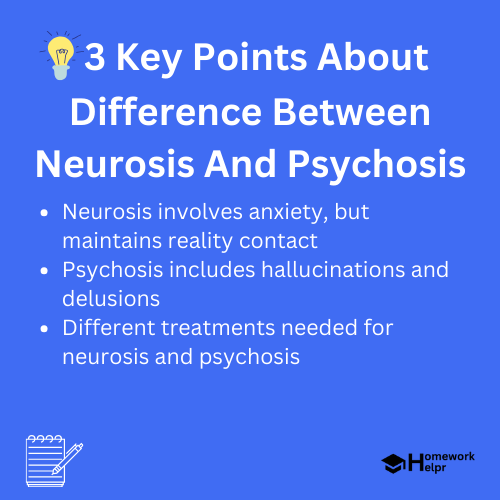📝 Summary
Understanding mental health involves distinguishing between neurosis and psychosis. Neurosis encompasses various conditions like anxiety and obsessive-compulsive disorder where individuals remain in contact with reality but face emotional struggles. Symptoms include excessive worrying and persistent anxiety. In contrast, psychosis is characterized by a profound loss of contact with reality, featuring symptoms like hallucinations and delusions. While neurotic individuals generally function well, those with psychosis require intensive treatment including medication. The key differences include reality contact, symptom severity, and treatment approaches, highlighting the importance of understanding these terms for better mental health awareness.
Difference Between Neurosis And Psychosis
Understanding the realms of human mental health can often feel like navigating a complex maze. Two significant terms that arise in discussions surrounding mental disorders are neurosis and psychosis. Although both terms are associated with emotional distress and abnormal behavior, they represent very different psychological conditions. To truly grasp the distinctions, we need to delve into each term and their respective characteristics.
Defining Neurosis
Neurosis is a term used to describe a variety of mental health conditions that primarily involve anxiety, distress, and an inability to cope with everyday challenges. Individuals suffering from neurosis remain in touch with reality but experience severe emotional disturbances. Common forms of neurosis include obsessive-compulsive disorder (OCD), generalized anxiety disorder (GAD), and phobias.
Definition
Neurosis: A class of functional mental disorders involving chronic distress but no loss of contact with reality.
Symptoms of neurosis can manifest in various ways, including:
- Excessive worrying about everyday situations.
- Persistent anxiety that may lead to physical symptoms.
- Fear and avoidance of certain triggers or situations.
Many neurotic individuals can function well in society but may experience emotional struggles that can interfere with their relationships and daily activities. They often seek therapy or counseling to help manage their symptoms.
Common Examples of Neurosis
Example
1. A student who constantly fears failing their exams and finds themselves studying excessively, leading to burnout-this may be categorized as academic anxiety.
Example
2. An individual who develops a strong need to check the locks on their doors multiple times before leaving home, indicative of obsessive-compulsive disorder.
Understanding Psychosis
In contrast, psychosis refers to a more severe mental health disorder that is characterized by a significant loss of contact with reality. Individuals experiencing psychosis may hallucinate, which means they see or hear things that aren’t there, or they may develop delusions-strong beliefs that are not based in reality. Common disorders that feature psychotic symptoms include schizophrenia and schizoaffective disorder.
Definition
Psychosis: A mental disorder characterized by a disconnection from reality, including hallucinations and delusions.
Symptoms of psychosis can be more intense and disruptive compared to neurosis. They may include:
- Hallucinations: Sensing things that do not exist, such as hearing voices.
- Delusions: Holding false beliefs despite contradictory evidence.
- Impaired insight: Not recognizing that their perceptions are distorted.
Individuals suffering from psychosis often require intensive treatment, including antipsychotic medications and therapy, to help them regain their connection to reality.
Common Examples of Psychosis
Example
1. Someone who believes they are under constant surveillance and that others are plotting against them, despite no factual evidence supporting these beliefs.
Example
2. A person who reports hearing voices that tell them to perform certain actions, which could pose a danger to themselves or others.
Comparing Neurosis and Psychosis
Upon examining these two conditions, it becomes evident that while both neurosis and psychosis relate to mental disorders, they differ significantly in terms of severity, symptoms, and treatment approaches. Here are some key differences:
- Reality Contact: Individuals with neurosis maintain contact with reality, whereas those with psychosis lose touch with it.
- Severity of Symptoms: Neurotic symptoms cause distress but do not disrupt daily functioning significantly; psychotic symptoms often lead to stark disruptions in life.
- Common Treatments: Therapy and counseling can often help neurotic patients considerably, while psychosis typically requires medication and more intensive intervention.
Fun Fact About Mental Health
💡Did You Know?
Did you know that the famous artist Vincent van Gogh is believed to have suffered from psychosis, which influenced his extraordinary artistic expression?
Conclusion
In conclusion, while neurosis and psychosis both represent significant mental health issues, they are fundamentally different in nature and impact on an individual’s life. Understanding these differences is crucial for fostering empathy and awareness regarding mental health conditions. By recognizing the signs and symptoms, individuals can seek appropriate help and support. As society continues to evolve in its understanding of mental health, it is vital to educate ourselves about these terms and encourage open conversations around them.
Thanks for exploring the differences between neurosis and psychosis! Remember, mental health is just as important as physical health, and taking steps towards understanding it can pave the way for better support systems and healthier communities.

Related Questions on Difference Between Neurosis And Psychosis
What is neurosis?
Answer: Neurosis refers to a variety of mental health conditions involving anxiety and emotional distress without a loss of reality.
What are the symptoms of psychosis?
Answer: Psychosis symptoms include hallucinations, delusions, and impaired insight, leading to a disconnect from reality.
How is neurosis treated?
Answer: Neurosis is often treated through therapy and counseling, which helps manage symptoms effectively.
Can psychosis be managed without medication?
Answer: While therapy may assist, psychosis often requires medication for effective management and recovery.
